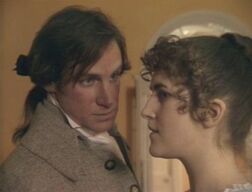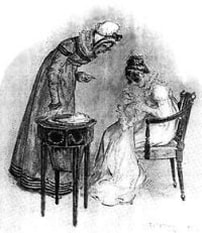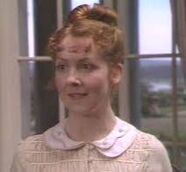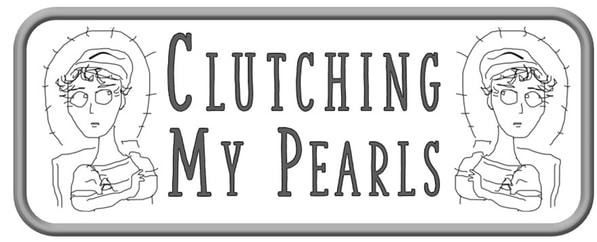| "Give a girl an education, and introduce her properly into the world, and ten to one but she has the means of settling well, without farther expense to anybody." -- Mrs. Norris, Mansfield Park |
 1983 Mansfield Park mini-series
1983 Mansfield Park mini-series Mansfield Park is--by far--the most misunderstood of Jane Austen’s novels in modern times. Canadian author Douglas Glover says: "Mansfield Park is a brilliant book, a great book, breathtaking in its invention and orchestration. The British critic of the novel Q. D. Leavis called it 'the first modern novel in England.' And yet it is alien territory for the contemporary reader."
This next series of blog posts is a resumption of my earlier discussion, last April, about Mansfield Park. Back then I disputed the contention that Mansfield Park is an extended symbolic protest of slavery. I’ve shared evidence to show that it was not controversial or dangerous to oppose slavery in Austen's day and many novelists did so. See here, here, and here. In short, last year I discussed what I think Mansfield Park is not about. Now I plan to talk about what I think it is about.
Notice that Glover speaks of invention and orchestration; his first focus is on Austen's craft. I hardly feel qualified to opine about the development of the novel, but I am afraid that many university students today are signing up to learn about English literature and they walk out having learned nothing about the development of the novel. This is because their professors are intent upon giving them a history lesson instead, a particular type of history which treats the past not as a chronicle of progress but a catalogue of crimes.
Yes, Glover's "alien territory" refers to Austen's stern moral universe. If you have an understanding of the economics and the religious beliefs of the Regency period, then you can better understand that moral universe. You can also better understand what makes Austen a great author by studying her work in its literary as well as its historical context...
 Anna Massey as Mrs. Norris
Anna Massey as Mrs. Norris I merely differ with those who argue that Austen intended for us to think that Mary Crawford or Maria Bertram are the real heroines of Mansfield Park. Despite the fact of Sir Thomas's West Indian property, I think Edmund Bertram and Sir Thomas are in fact intended by Austen to be the moral arbiters of the novel, along with Fanny. In this post, and in future posts, I will lay out my reasons for concluding that Mansfield Park is chiefly a novel about educating your children properly and what happens when people neglect their duties.
It’s a novel about how easy it is to deceive oneself. And Austen writes brilliant dialogue showing people deceiving themselves.
Austen shows us that in real life, evil does not announce itself with devil’s horns. Austen gives us nuanced portraits of well-meaning people who cause harm.
She gives us an unforgettable portrait of a self-satisfied hypocrite. She shows us that standing up for virtue, for correct behaviour, can be a lonely business...
Female education--specifically, how to educate females properly--was a common theme in novels of Austen's time. Examples include The PIcture by the Misses Minifie (1766), Adelaide and Theodore (1783) by Stéphanie-Félicité de Genlis, Thomas Skinner Surr's Consequences: or, Adventures at Rraxall Castle, (1786), Twin Sisters, or the Effects of Education by anonymous (1788-89), Eliza Parsons’ Errors of Education (1791) Clara Reeves's Plans of Education (1792), Jane West's The Advantages of Education (1793) and A Tale of the Times (1799), Anna Maria Porter's Elinor, or the Errors of Education in Artless Tales (1796), Elizabeth Helme's Albert, or, the Wilds of Strathnavern (1799), The Enchanted Mirror: A Moorish Romance (1800), John Corry's The Unfortunate Daughter: Or, The Danger of the Modern System of Female Education, (1803). Hannah More's Coelebs in Search of a Wife (1809), Medora Gordon Byron's Celia in Search of a Husband (1809), Henry Kett's Emily, a Moral Tale (1809), Eleanor Sleath's The Bristol Heiress, or, The Errors of Education (1809), Edward Nares' Thinks I To Myself (1811), Sarah Green's Good Men of Modern Date (1811) and I'll Consider of It (1812), Mary Brunton's Discipline (1814), Anne Raikes Harding's Correction (1818), Susan Ferrier's Marriage (1818), and Ostentation and Liberality (1821), by Arabella Argus. An over-indulged young man features in Mrs. Griffiths' The Dangerous Effects of a Wrong Education: or, The Fatal Contest (1780), and a young hero benefits from a good education in Mrs. Meeke's Stratagems Defeated (1811). Education and child-rearing for males and females features in Fanny Fitz-York, Heiress of Tremorne (1818).
- In The Advantages of Education, Mrs. Williams is reunited with her daughter Maria after many years’ separation and undertakes to finish her education. The author devotes all of Chapter Five to an editorial on female education. “She clearly saw that, like a rich neglected garden, her daughter’s uncultivated mind ran into disorder and irregularity…”
- In Coelebs in Search of a Wife, the bachelor Charles takes advice from his mother about finding a well-educated wife: “The education of the present race of females is not very favourable to domestic happiness. For my own part, I call education, not that which smothers a woman with accomplishments, but that which tends to consolidate a firm and regular system of character; that which tends to form a friend, a companion, and a wife.”
- Grizilda Twist in Thinks I To Myself “had many masters, (ie expert tutors in various subjects), and therefore might naturally be expected to know much;--far more than I thought it necessary for her to know:--she had learnt I know not what;--music, dancing, painting, these were common, vulgar accomplishments;--she had attended a world of fashionable lectures, and was therefore supposed to understand Chemistry, Geology, Philology, and a hundred other ologies, for what I know, enough, as I thought, to distract her brain…”
- In The Parson’s Wife (1789), a minor character named Wilhelmina elopes against her parents' wishes. Their neighbour Mr. Godfrey comments that her rash behavior can be traced to a faulty upbringing. Wilhelmina's father “is indeed, deluded and disgraced, but, more by his own opinions than his daughter’s conduct.—Vain man! Had he laboured to adorn her mind, instead of her person, he might have met the gratitude he expected—but I will not judge harshly—perhaps, in his youth, he suffered neglect in the same point…”
- In Discipline, the spoiled young heiress recalls her boarding-school days: “We were taught the French and Italian languages; but in as far as was compatible with these acquisitions, we remained in ignorance of the accurate science, or elegant literature to which they might have introduced us. We learnt to draw landscape; but, secluded from the fair originals of nature, we gained not one idea from the art, except such as were purely mechanical.”
One reason Mansfield Park has endured while other novels are forgotten is Austen's skill and subtlety in comparison with the didactic tomes of other authors of the day. Unlike her peers, Jane Austen seldom breaks off from her story-telling to lecture and moralize. Her characters are more than stereotyped walking, talking points of view, and her humour is subtle and delicious. Compare any of the passages on education in the novels I've listed above with the hilarious conversation of the Bertram girls with Mrs. Norris when they boast of their knowledge of all the "metals, semi-metals, planets, and distinguished philosophers" to really appreciate how Austen makes her point without lecturing her readers.
 Liz Crowther as Julia Bertram, 1983
Liz Crowther as Julia Bertram, 1983 I think we can safely conclude that when she addresses her readers directly, she is pointing something out to us, something she thinks is important.
Almost invariably, her editorial interjections in Mansfield Park have to do (broadly speaking) with education and the consequences of a faulty upbringing.
Below I've quoted one of the most notable examples but I will discuss these authorial interjections in greater detail further along;
| “The politeness which [Julia Bertram] had been brought up to practise as a duty made it impossible for her to escape [the boring company of Mrs. Rushworth]; while the want of that higher species of self-command, that just consideration of others, that knowledge of her own heart, that principle of right, which had not formed any essential part of her education, made her miserable under it." |
| “’I know [Mary Crawford’s] disposition to be as sweet and faultless as your own,’ [Edmund tells Fanny] but the influence of her former companions makes her seem—gives to her conversation, to her professed opinions, sometimes a tinge of wrong…’ “’The effect of education,’ said Fanny gently.” |
I’ll expand on this idea, and compare Mansfield Park to some other novels of this period that took up the same theme, in future posts. I'll be talking about the Regency version of nature versus nurture, Regency ideas about intelligence and knowledge, the vast gulf between Regency notions of female chastity and the present day, how education is tied to social class, and the debate around female education and accomplishments in Austen's time.
Also see "Till I am Seventeen," and "What Austen Said About Maria." Next post: Disposition and Temper
| In my variation on Mansfield Park, A Contrary Wind, we briefly meet Miss Lee, the Bertrams' former governess, who is an off-stage character in Austen's novel. We learn a little about her backstory too. Click here for more about my books. Harriet and Ellen of the Reading Jane Austen podcast have begun their close reading of Mansfield Park. Maggie and Kristin of First Impressions podcast have three episodes on Mansfield Park and more episodes on the various adaptations of the novel. The first episode is here. Both podcasts are a treat for Austenites. In this post, I stated that Austen addresses the reader directly more often in Mansfield Park than in her other novels. But in his What Matters in Jane Austen, John Mullan say that she does this most often in Northanger Abbey. He has a fascinating chapter which discusses "When Does Jane Austen Speak Directly To The Reader?" Clutching My Pearls is about Jane Austen and the times she lived in. The opinions are mine, but I don't claim originality. Much has been written about Austen. Click here for the first in the series. |

 RSS Feed
RSS Feed